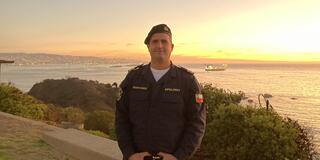Meet Francisco Martinez MIA '20, Officer in the Chilean Navy

My name is Francisco Martinez, a Class of 2020 graduate of the Master of International Affairs (MIA) program with a International Security Policy (ISP) concentration and specializing in East Asia.
What did you do before attending SIPA?
I am an officer in the Chilean Navy. I was posted in the Naval Polytechnic Academy in Vina del Mar, Chile. My job there was to make sure the naval undergraduates succeed in their professional and technical careers. I was also sent as liaison to an Argentinian navy ship to patrol the Antarctic. Been in the Antarctic was an experience out of this world. Sealife, low temperatures, and Scientifics doing research showed how humankind could work under extreme conditions while also taking care of the environment. The mix of nationalities of all of us there in the Antarctic made me think that working in a multicultural environment is a challenge that I would love to take.
Why did you choose the ISP concentration and East Asia regional specialization?
I have been in the Navy for twenty years. During all those years, I was intrigued by Defense topics like Great Power competition and the different flashpoints around the world. Also, I like History, so I wanted to study how History has shaped security issues until today.
Before accepting the admission offer to join Columbia University, I thought about going to East Asia or Europe, perhaps to study. Still, then I realized that the U.S. had experienced professors in all security and regional studies, so I thought that I definitely wanted to join ISP here at SIPA.
About the specialization, I wasn’t sure about it. I changed halfway through my second year. I wanted to take more security courses, but the specialization requirement forced me to look for the one that contains more security studies, that’s why I chose East Asia. Before joining SIPA, I thought I knew about that part of the world. Still, after taking classes with professors Christensen, Scott, Hikotami, and Noerper, I realized that I had to be humble about my "knowledge."
What are some of your most memorable SIPA experiences?
Definitely the D.C. Conference and the ISP Crisis simulation. In the former, I realized the importance that SIPA gives to the networking event. The most prominent place to shape policy is Washington D.C. I was amazed about the interaction between alumni and current SIPA students. I never thought about a networking event like that, but at the same time, it made complete sense to me. The ISP crisis simulation was a helpful way to prepare students to interact with each other in a crisis simulation environment. I took part in the organizing team, and it was interesting to see how some teams immersed themselves in their role and start acting like the countries they were representing. Even though we had a script about the simulation, the students' ingenuity never stopped to amaze us during the event.
The next event that was memorable to me was the Staff ride to Gettysburg. Professor Stephen Biddle led the trip. He showed us the different perspectives from the soldiers on the ground that day, like how the trees affect the line of sight of cannons, or the effort required to prepare the scenario for battle with short notice. I realized that, as a Navy guy, my knowledge about inland operations was quite limited. I saw that in the field, the battle is much different than in the planning process. This may sound obvious to some of the readers, but for future leaders, it is crucial. You cannot successfully lead teams when you don't know what the challenges they will face are. That was the main takeaway from my experience on that trip.
How did SIPA affect you?
SIPA change the way I saw the University. Before coming to SIPA, I was thinking about just to study, like sitting in a classroom and then going to the library. However, I was amazed at the opportunities for networking with different organizations or alumni. The other big part was the challenges, conferences, and simulations. On these occasions, students could participate as active members of teams and develop ideas or new policies to have a big impact on the challenge ahead.
The other aspect was that different perspectives shared in classes for the students. In some issues, I learned how the same problem could be seen from the different approaches. Accordingly, new policies could be implemented from those perspectives to be more effective at making the world a better place.
What did you do after SIPA?
I returned to the Navy. These are hard times, social unrest, and the Coronavirus pandemic made me think that, after all, that I learned at SIPA, I could apply the theory and be useful to Chile, contributing to make it a better place for everyone. During the last days of the Spring semester, I spent roughly one month at home, just finishing exams, while many people around the world were risking their lives to save their fellow citizens. It was then when I felt the need to act and do something. Now, after graduation from SIPA, I am doing something for my compatriots.